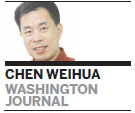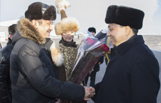Exceptional, hawkish Talent talks about a rising China
By Chen Weihua (China Daily USA) Updated: 2014-12-09 12:27Former US Senator Jim Talent from Missouri was a senior policy adviser for Mitt Romney during the latter's 2008 and 2012 run for president. On Monday, he was introduced as the US defense minister if Romney had won the elections.

But to several Chinese listeners in the Allison Auditorium of the Heritage Foundation where Talent was talking about US national security and rising China, they felt glad that neither the departing Secretary of Defense Chuck Hagel nor the upcoming one, Ashton Carter, nominated last week by President Barack Obama to be the next Pentagon chief, sounds as hawkish as the one at the podium.
Like many US politicians, Talent suggested in his speech that the US is for peace in the Asia-Pacific region and China is not, regardless of the repeated statements by top Chinese leaders, from President Xi Jinping to Premier Li Keqiang, that maintaining regional peaceful and stable development is China's top priority.
To many Chinese, any US politicians who suggest that China is not keen on peace and stability in the region and the world are ignoring the reality. China has as much at stake as anyone else in the peace and stability of the region as well as freedom of navigation in the South and East China seas. China is the world's largest trading nation, and it is not the US, but China that is the largest trading partner for most countries in the region.
In terms of track record, China has not engaged in any war for several decades, except a brief 27-day border war with Vietnam in 1979. The US, meanwhile, has not stopped waging wars as demonstrated by the catastrophic wars in Iraq and Afghanistan this past decade.
Talent was not in Congress when it voted in 2002 authorizing the war in Iraq, but he said in October 2006 that he would have voted for the war knowing that Iraq had no weapons of mass destruction.
Like some US politicians, Talent questioned the legitimacy of Chinese leaders and the ruling Chinese Communist Party based on China not having a Western-style free election.
It is true that such a free election does not exist in China, yet the approval rating of Chinese leaders among the Chinese people has been much higher than that for US president among American people, according to surveys conducted by US and European organizations. In a few years time, the Chinese Communist Party will become the longest unbroken ruling party in the world.
As Talent raised the legitimacy question, some Chinese in the room had a similar one for the current US president. They would ask whether Obama has lost his legitimacy given the latest Gallup poll from Dec 5-7 showing that Americans' approval for their president was only 44 percent, while disapproval stood at 51 percent. Such low approval has been consistent for much of the past four years.
This is not to mention the US Congress, where Talent once served in both chambers. In October, less than a month before the midterm election, a Gallup poll showed that Congress's approval rating among Americans was only 14 percent. Gratifyingly, it was 5 percentage points above the historical low of 9 percent recorded in November 2013.
A Rasmussen Reports survey last month painted a similar picture. It found that 8 percent of likely US voters rate Congress's performance as good or excellent, while 64 percent rate its performance as poor.
Talent expressed his surprise at China's military buildup. He lamented the US military spending cuts due to the budget sequester. But to many Chinese, they are often puzzled why the US, which spends four times as much as China on military, would constantly display such paranoia.
When Talent warned of Chinese improved anti-access and area denial capability, he failed to mention that it is a defensive strategy, while the Air Sea Battle pursued by the US is offensive or pre-emptive in nature.
It may not be a surprise for Talent to distort the facts because last month's 2014 Report to Congress by the US-China Economic and Security Review Commission, where Talent serves, put nearly everything happening in China in a negative light.
Talent proposed a US military strategy that seeks to increase the cost of Chinese military buildup. It is clearly sounding a bugle for an arms race.
Talent was skeptical when Chinese President Xi repeatedly said his nation will not seek hegemony regardless how strong it becomes. However, to the rest of the world, the only country that is hegemonic on Earth is the US. And most Chinese don't even take seriously the fact that China's economy may have already or will become the largest in the world.
Contact the writer at chenweihua@chinadailyusa.com






